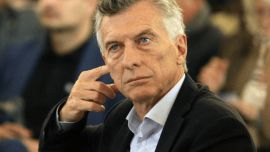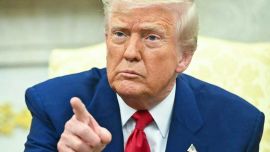There are few presidents in the world today with more radically different economic models than Argentina’s Javier Milei and Brazil’s Luiz Inácio Lula da Silva.
Milei is desperate to gut public spending, sell off state-run companies and slash regulations. Lula, meanwhile, hounds his aides to ramp up spending, revitalise state companies to drive industrial policy and strengthen regulations to protect workers and the environment.
That the two men lead neighbouring countries — rival commodity powerhouses, long-time trade partners, allies and, of course, mortal enemies on the football field — makes the ideological clash all the more stark. Tensions have flared again and again. Milei has a habit of calling Lula a “Communist.” Lula in turn sticks Milei in his bucket of “primitive” nationalists. Their top diplomats are then sent to patch things up.
But the huge divide remains clear in the pretty distinct crowd each leader attracts. Brazil’s former president Jair Bolsonaro, Hungary’s Viktor Orban and Elon Musk have all supported Milei, while Lula this week is hosting Emmanuel Macron in the Amazon and Brasília, after holding more than one meeting with both US President Joe Biden and German Chancellor Olaf Scholz since his 2022 re-election. He also has China’s Xi Jinping in his corner.
So the question hanging over their countries and the broader developing world is: which administration and which economic vision will prove more successful? The two leaders, of course, inherited far different economies. Brazil grew above expectations last year with inflation below five percent. Argentina is sputtering toward yet another recession with 276 percent inflation.
This makes rendering judgment difficult. And yet in a region that has seen power swing wildly from the political left to the right and back to the left over the past decade, the outcome will be scrutinised by government insiders, pundits and especially skittish investors who are waiting to see if Milei’s drastic reforms can turn Argentina into a more attractive option than Brazil. The United States and China are also watching closely, given that both South American nations may play growing roles in their intensifying competition for food, energy resources and economic dominance in the coming years.
“Javier Milei has the potential of showing himself as a Latin American leader who is aligned with a new, more conservative right-wing vision that was crystallised in his speech at the World Economic Forum,” said Juan Cruz Díaz, managing director at the Cefeidas Group, a political risk consultancy firm. “Lula has been there, you know him. He may not be 100 percent aligned to some investors’ views, but they don’t see a situation in which they find some instability or lack of sustainability.”
Late in 2022, global investors had big expectations for Lula, the leftist who led Brazil during the boom-times of the early 2000s and who was poised to embrace a pragmatic platform once taking office. But even amid better-than-expected economic performance last year, they began to sour on Latin America’s largest nation.
A riotous insurrection seeking to overturn Lula’s victory in January 2023 fuelled fears of political instability and was followed by an accounting scandal that sent the country’s retail giant into a tailspin. Then Lula’s battle with the Central Bank over high interest rates was the last straw that sent investors seeking refuge in faster-growing India and nearshoring-champion Mexico.
Argentina was hardly an option for much of last year, as inflation spiralled into the triple-digits and ramped up pressure on the already-limping economy. But Milei’s promises of “shock therapy” austerity and deep reforms caught investor attention, especially after he surged to an unexpected victory. Stocks soared when he won the November election.
Not everyone is piling into Argentina just yet. Lula has since backed down in his battle with Brazil’s Central Bank, and while he has sought to spend more, he has also largely supported Finance Minister Fernando Haddad’s efforts to shore up the country’s public finances and eliminate its primary fiscal deficit — a push markets have cheered.
“In theory, investors are more comfortable with Milei’s model because it’s more fiscally conservative and should help to bring down inflation more quickly,” said Katrina Butt, a senior Latin America Economist at AllianceBernstein in New York. “But Lula has proved to be successful and has avoided pursuing extreme leftist policies.”
Milei has also run into trouble in Argentina’s Congress, where his coalition is in the minority. His sweeping decree to deregulate the economy is at risk after the Senate rejected it earlier in March, while he has had to water down his omnibus reform package in an attempt to assuage opposing lawmakers and hostile governors.
That has left many investors wary of a full embrace of Milei — especially when compared with Lula, who remains a known commodity even if his recent pushes to spend more and use state-controlled companies to speed up economic growth inspire scepticism.
To be sure, the trading of barbs between Lula and Milei has had little practical impact on economic relations between their countries. Brazil and Argentina remain each other’s largest trading partners in Latin America, and their economies are deeply intertwined. Political turbulence is hardly a new dynamic for the two nations whose leaders have rarely been ideologically aligned this century.
“In the past decade, Argentina and Brazil were — more frequently than not — led by politicians of opposing ideological spectrum: that was the case with [Mauricio] Macri-Dilma [Rousseff], [Alberto] Fernandez-Bolsonaro, and now Milei-Lula. This asynchrony matters less than might appear at a first sight. Regardless of their ideological differences, neither leader can sever ties with the other: Brazil is the top destination market for Argentine exports, and Argentina is the third-largest market for Brazil’s external sales and the destination of 40 percent of exports of the Brazilian car industry," said Adriana Dupita, Bloomberg's Brazil & Argentina economist.
"At the same time, even when the governments are in sync, neither country can go beyond in helping: the indebted Brazilian government typically does not loan large amounts to other countries, and cash-strapped Argentina, regardless of how liberal its seating president may be, won’t completely open markets to Brazilian products. That renders the economic relationship of both countries a lot more sensitive to their economic cycles and currency swings than to the changes in political winds.”
It’s in the competition for foreign investment and political alliances that Milei’s and Lula’s role will be crucial. The White House has so far sought to keep both nations in the US orbit. Even as Lula bucked the US position on Russia’s war in Ukraine and pushed to strengthen ties with China, he has met Biden twice, securing a pledged contribution to Brazil’s flagship Amazon rainforest protection fund and a joint partnership to bolster worker protections.
US Secretary of State Antony Blinken, meanwhile, visited both nations last month, and specifically cited Milei’s support for Ukraine and Israel in their current conflicts as a primary source of agreement between the two governments.
“Lula’s government has not fully committed to fill the role the United States asks of it, opening up the chance for Argentina to step up instead,” said Alejandro Díaz, the chief executive office of the American Chamber of Commerce in Argentina (AmCham). “Milei’s proactive indication that his two geopolitical allies will be the United States and Israel clearly sets him up on that path.”
Lula and Milei have never met. The Brazilian skipped the Argentine’s presidential inauguration. At this rate their paths will only cross — inevitably — at the Group of 20 summit of leaders in Rio de Janeiro, where Lula will have the advantage of being the host.
by Manuela Tobias & Simone Iglesias, Bloomberg



















Comments